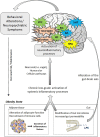Neuropsychiatric comorbidity in obesity: role of inflammatory processes
- PMID: 24860551
- PMCID: PMC4030152
- DOI: 10.3389/fendo.2014.00074
Neuropsychiatric comorbidity in obesity: role of inflammatory processes
Abstract
Neuropsychiatric symptoms are frequent in obesity. In addition to their substantial economic and health impact, these symptoms significantly interfere with the quality of life and social function of obese individuals. While the pathophysiological mechanisms underlying obesity-related neuropsychiatric symptoms are still under investigation and remain to be clearly identified, there is increasing evidence for a role of inflammatory processes. Obesity is characterized by a chronic low-grade inflammatory state that is likely to influence neuropsychiatric status given the well-known and highly documented effects of inflammation on brain activity/function and behavior. This hypothesis is supported by recent findings emanating from clinical investigations in obese subjects and from experimentations conducted in animal models of obesity. These studies converge to show that obesity-related inflammatory processes, originating either from the adipose tissue or gut microbiota environment, spread to the brain where they lead to substantial changes in neurocircuitry, neuroendocrine activity, neurotransmitter metabolism and activity, and neurogenesis. Together, these alterations contribute to shape the propitious bases for the development of obesity-related neuropsychiatric comorbidities.
Keywords: cognition; cytokines; gut-brain axis; inflammation; mood; neuroinflammation; neuropsychiatric symptoms; obesity.
Figures


References
Publication types
LinkOut - more resources
Full Text Sources
Other Literature Sources

